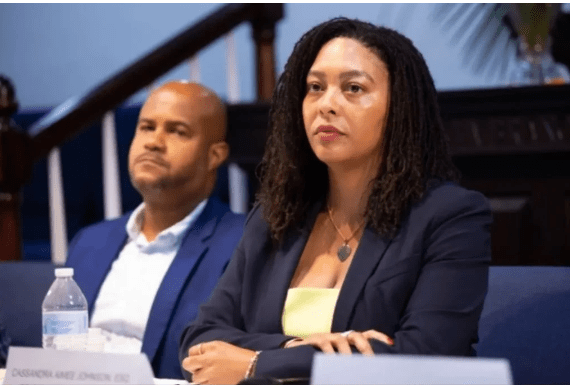This year’s election for the coveted spot on the Queens Surrogate’s Court bench is down to two judges, Cassandra Johnson and Wendy Li.
Johnson, a lifelong Queens resident, is vying for a position that involves ruling on cases pertaining to wills, estates and deeds across Queens. She believes that she has the experience and expertise for the job; she also has the backing of Democrats such as U.S. Rep. Gregory Meeks, who chairs the Queens County Democratic Party.
Johnson grew up with an attorney mother who inspired her passion for the judicial field. “I started my legal career working for my mother in high school. She has an office in Brooklyn and Queens, and I worked with her through college,” she said.
In college, Johnson was a math major in pursuit of an engineering career, but later realized that she wanted to go to law school. “Working for [my mother], I got to realize the impact attorneys have on our lives; they’re really like social engineers,” she said.
Johnson added that she was inspired to advocate for and protect society’s most vulnerable and learned to respect the role courts play in upholding justice.
Johnson went on to graduate from St. John’s University’s Law School in 2006.
During law school, she continued to work at her mother’s practice, where she focused on trust and estates, adoption matters and real estate litigation.
“It was an eye-opening experience; you’re dealing with really sensitive matters, dealing with the surrogate court and state proceedings and guardianship matters,” she said.
In 2007, Johnson was hired to do legal work for the City of New York, where she focused on class action work and preventative litigation. By 2010, she had her first opportunity to work with a judge in the Queens Supreme Court, where she worked on matrimonial matters. She also got to work with a judge in the commercial division with business litigation. Johnson’s experience led her to become a court attorney referee, where she focused on commercial litigation, mediation and foreclosure matters.
Johnson explained that her time as a court attorney and referee piqued her interest in becoming a judge. She ran for civil court in Queens, and, in 2021, she became a civil court judge. Her time as a civil court judge meant she presided over all of the parts of the civil court, including commercial, housing and no-fault.
Currently, she serves as supreme court justice in the Long Island City courthouse. She oversees labor law cases, personal injury matters and contract disputes. “They are all types of matters, whether they be equitable in nature or if someone’s suing for money. Unlike the civil court, the supreme court is a court of general jurisdiction and has more authority and is the highest trial court in the state,” she said.
Johnson said she was inspired to run for Queens Surrogate’s Court because she believes in the tenet of public service. “When we talk about the surrogate’s court and meeting the needs of our community at this time when people are grieving, um, I have a deep faith that in the service of our society, we can advance the law,” she said.
Johnson said that if elected to the role of surrogate judge, she would first make her own observations prior to making any specific changes to the system. “The whole purpose of my role as a judge in my view is to ensure equal treatment for all persons who appear in the courthouse, to ensure that people are treated with dignity and fairness regardless of their background and dispense justice in a fair and impartial way,” she said.
She added that it is important to make programs in order to foster an equitable court system. “I think that it’s prudent for someone who’s going to make a change to actually be there to make the change,” she said. Johnson shared an idea she had for the surrogate’s court based on her time as a Supreme Court Justice. She said the court could potentially benefit from the hiring of interpreters, given the diversity of Queens.
Johnson explained that if elected, she could foresee the surrogate working with other legal entities in Queens. She said that it is important to build relationships with local bar associations and organizations in order to gain awareness about the issues they have and foster a more supportive environment. “That’s something that I was a part of when I was in court, as early as being a court attorney referee,” she said. Johnson said during that period, she would sit down with the administrative judge and legal service providers to know what their issues were so they could be remedied.
She shared that one of the biggest challenges currently facing Queens Surrogate’s Court is having matters being dealt with expeditiously. “It’s something that I’ve heard is a recurring issue, and it is something that I would address to see how we could make things more efficient,” she said. Johnson did note that based on court system analysis of all the courts throughout the state, Queens has been deemed the most efficient court system. “I’m proud to know that,” she said, “I think the goal always is to see how we can make things more efficient.”
Johnson’s message to Queens residents is clear: the community’s vote matters. “We have an opportunity at each election to vote for people who we think could do the best in service to our community. I’m proud that having been in the community so long, and throughout my campaigning every day, I continue to meet people who are confident in my ability to be the judge of a surrogate court,” she said. Johnson added that she wants to administer justice in a way that is accessible and meaningful to others. “I look at myself as a judge who is representing everyone in Queens,” she said.




































